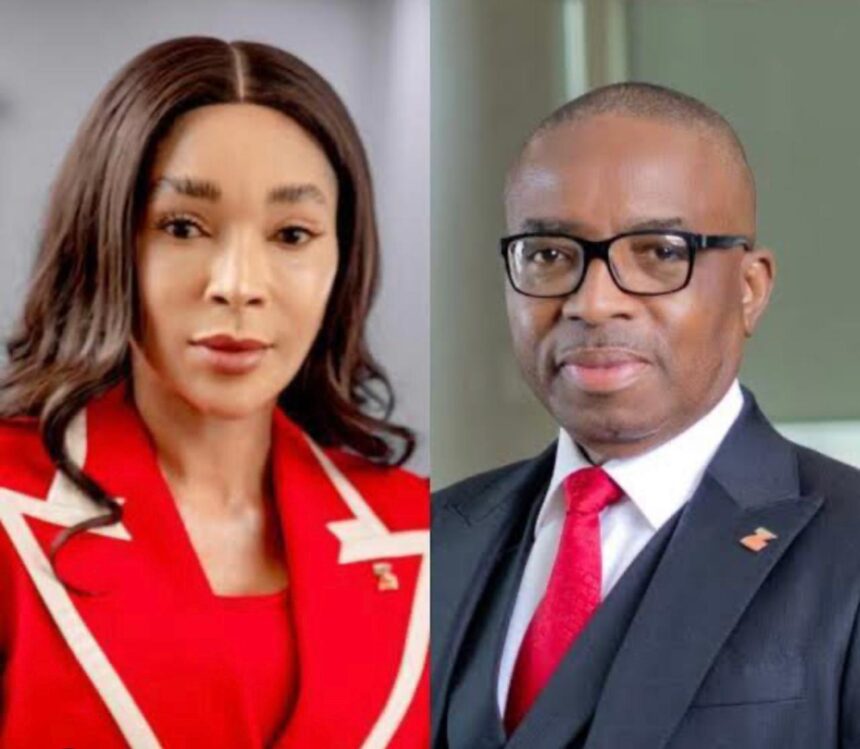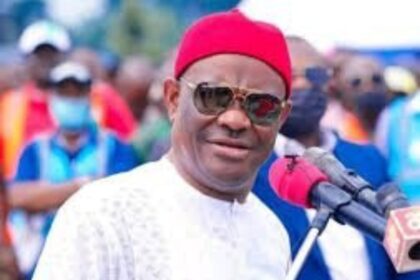– What Jim Ovia Must Do to Forestall Crisis
By Temitope Olusola
Indeed, at Zenith Bank, there’s a palpable sense of fear and anticipation in the air as employees whisper in hushed tones, eager to see who would emerge the head honcho of Zenith Holdings, the bank’s supervisory company.
Interestingly, however, If there was one thing that Adaora Umeoji understood quite early in life, it is the wisdom to never fence with an antagonist who would meet a rapier thrust with the blow of a battle axe.
This realism played out in her cautious politicking and deft manoeuvres en route to her emergence as the new Group Managing Director/Chief Executive Officer (GMD/CEO) of Zenith Bank.
Although she encountered fierce adversaries who tried to thwart her emergence as the bank’s CEO, Umeoji triumphed on the strength of her brilliance, bravado and the backing of her formidable godfather and Chairman of the bank, Jim Ovia.
But how effectively these would serve her in the coming days remain a matter fit only for conjecture.
Against the backdrop of shareholder approval for Zenith Bank’s transition into a holding company structure, there are speculations that Nigeria’s most profitable money lender might be in for an intense powerplay between forces loyal to Umeoji and those loyal to Ebenezer Onyeagwu.
While the decision, reached during a court-ordered Extraordinary General Meeting (EGM) held virtually over the weekend, marks a significant step in Zenith Bank’s evolution, there is no gainsaying it might reorder and recalibrate the bank’s power equation.
The approval, compliant with a Scheme of Arrangement established in March, paves the way for the transfer of 31.396 billion ordinary shares from Zenith Bank Plc to a newly formed Zenith Bank Holding Company Plc (HoldCo). Shareholders will receive equivalent shares in the HoldCo while existing Global Depositary Receipt (GDR) holders will get one new HoldCo GDR per existing GDR.
This approval thus bestows enormous powers on the Chief Executive Officer (CEO) of Zenith Holdings, a position that Ebenezer Onyeagwu is currently being suggested for in line with the usual culture in banking circuits, whereby former bank MDs go on to become CEOs of their banks’ holding companies – it would be recalled Guaranty Trust Bank (GTBank)’s Segun Agbaje and Access Bank’s late CEO, Herbert Wigwe, were vested with the leadership and control of their banks’ holding companies after their tenure as MD. It is equally noteworthy that late Wigwe’s partner and successor, Aig Imoukhuede, assumed control of Access Holdings in the wake of Wigwe’s death.
Will such a transition be allowed in Zenith Bank? In the realm of boardroom politics, denying Ebenezer Onyeagwu the leadership of Zenith Holdings could indeed be a strategic move, especially if there’s a fear that his appointment might undermine the authority and position of Adaora Umeoji, the current MD/CEO of Zenith Bank.
Pundits aver that boardroom politics might come into play and affect the bank’s internal power dynamics; within the board of Zenith Holdings, there might be factions or alliances formed based on personal or professional relationships. Those who support Adaora Umeoji’s leadership at Zenith Bank might resist Onyeagwu’s elevation to a higher position within the holding company, fearing that he could challenge or overshadow Umeoji’s authority.
Umeoji might also have influential backers within the board or among key shareholders who prefer to maintain the status quo. These backers could use their influence to block Onyeagwu’s advancement, ensuring that Umeoji remains unchallenged in her position.
Those aligned with Umeoji could also argue that Onyeagwu’s leadership style or strategic vision is not aligned with the direction they want for Zenith Holdings. They might highlight differences in management approach, risk appetite, or long-term objectives as reasons to keep him from assuming a leadership role within the holding company.
Maintaining harmony within the leadership team could equally be cited as a reason to deny Onyeagwu the top position. It could be argued that appointing him might disrupt the current team dynamics, leading to internal conflicts or power struggles that could be detrimental to the organization’s performance and unity.
Umeoji’s supporters might view Onyeagwu’s potential elevation as a threat to her position. They might fear that Onyeagwu, given his successful track record at Zenith Bank, could overshadow Umeoji’s achievements or even challenge her leadership directly, leading to a power struggle that could destabilize the organization.
Board members might also justify their decision based on legal or governance frameworks, citing that Onyeagwu’s appointment doesn’t comply with certain regulations or corporate governance guidelines. While these reasons might be legitimate, they could also be used as a smokescreen to mask underlying political motives.
In essence, boardroom politics can be a complex game where personal ambitions, alliances, and strategic interests often supersede what might be best for the organization as a whole. In this scenario, denying Onyeagwu the leadership of Zenith Holdings could be a manoeuvre to maintain the current power balance and protect the interests of Adaora Umeoji and her supporters within the organization.
As the chairman of Zenith Bank, Jim Ovia would likely play a crucial role in handling the situation between Ebenezer Onyeagwu and Adaora Umeoji, ensuring that it doesn’t escalate into a full-blown crisis within the organization.
To forestall crisis, Ovia would likely initiate a series of discussions with both Onyeagwu and Umeoji to understand their perspectives and concerns. He would act as a mediator, facilitating constructive dialogue aimed at finding common ground and resolving any underlying issues.
Ovia would clarify the roles and responsibilities of both Onyeagwu and Umeoji within the organization, ensuring that no ambiguity or overlap could lead to conflict. He might also emphasize the complementary nature of their positions, highlighting how their collaboration can benefit the bank and the holding company.
Ovia would engage with key stakeholders, including shareholders, regulators, and customers, to provide assurance and transparency regarding the management of the bank. He would communicate the steps being taken to address the situation and reinforce confidence in the bank’s leadership and governance structures.
Overall, Jim Ovia should aim to navigate the delicate situation with diplomacy, strategic thinking, and a focus on maintaining the stability and reputation of Zenith Bank under his leadership. By fostering a culture of transparency, collaboration, and performance-driven leadership, he would seek to resolve any tensions and ensure the continued success of the organization.




